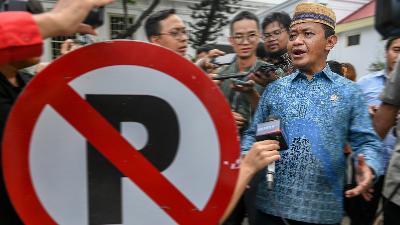Pretending to Reduce Emissions
Monday, March 4, 2024
The REDD+ program brought in money, but failed to protect forests. Millions of hectares of forests become concession areas for mining corporations.
arsip tempo : 174548402287.

THE Reducing Emissions from Deforestation and Forest Degradation (REDD+) program in Indonesia seems to be sweet on the lips, but sticks in the throat. Citing its forests, which it claims are the most extensive in the world, the Indonesian government has asked western nations to provide donations to fund actions mitigating the climate crisis. However, once it obtains the money, Indonesia then ignores the forests that have become REDD+ working areas, like a farmer moving from one field to another.
The REDD+ initiative, which began in 2010, is aimed at providing financial incentives to developing nations to keep their forests intact—which in turn is hoped will help to reduce global carbon emissions. Indonesia first asked for REDD+ funds in 2014. So far, through a number of multilateral and bilateral cooperative schemes, Indonesia has obtained approximately US$439 million of REDD+ funding.
The REDD+ program is not only aimed at reducing carbon emissions. The plus sign in the abbreviation means it also applies to activities to preserve forest carbon stocks and to manage protected forests. There is also an obligation to improve the lives of local people who depend on these forests. However, the fact is that there are still many problems with Indonesia’s consistency in preserving forests and their ecosystems—including protecting the rights of indigenous people around forests.
One example of the failure of the REDD+ program to protect forests from deforestation is Mantangai Hulu village, Kapuas Regency, West Kalimantan. This village of the Dayak Ngaju people is one of seven that have been affected by the impact of the first model REDD+ program in Indonesia. Known as the Kalimantan Forest and Climate Partnership (KFCP), this project funded by Australia to the tune of A$37.47 million aimed at restoring a 120,000-hectare peat bog in an area formerly the site of a one-million-hectare oil palm project.
However, it did not go smoothly. Australia halted the KFCP project in 2014. Among other problems was minimal support from the central and regional governments. A month before ending the program, the Kapuas Regency government awarded a 5,101-hectare forestry permit to Kalimantan Lestari Mandiri, a subsidiary of the Chinese Tianjin Julong Group. This concession included the entire KFCP working area, meaning that local people could only stand and stare when heavy equipment uprooted the rubber trees and other jungle plants that they had planted.
The Indonesian government gives the impression of only seeking to obtain REDD+ funds, without caring about forests under threat of being swallowed up by concession areas. As proof of this, the government still continues to sell business and forestry permits to corporations, especially since the passing of the Job Creation Law. In East Kalimantan, for example, based on analysis of spatial data carried out by the Auriga Nusantara foundation from 2012 to 2023, more than half of the REDD+ working areas were turned into mining concession areas, oil palm plantations or industrial forests. The total size of the REDD+ working areas cleared is equivalent to the area of West Java province.
These large-scale changes in forest use to concession areas are proof that the evaluation of the implementation of REDD+ is not working. While the REDD+ Management Agency has not been abolished, the government has established an evaluation team that recommended the formation of a one-map policy and the involvement of the Corruption Eradication Commission in calculating potential corruption related to natural resources. The problem is that the government has not followed up on a single one of these recommendations.











